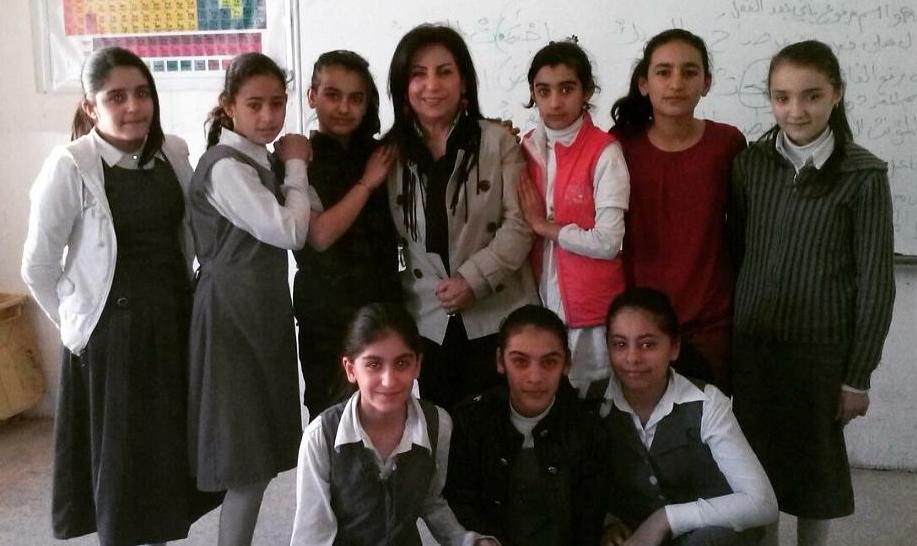Frial Hussein
- updated: December 7, 2020
- |
Frial Hussein was born in Latakia, residing now in Germany, graduated from the Teachers’ academy and worked as a teacher for the primary stage, in addition to her interest in political and social work. Frial is a member of the Syrian Women’s Political Movement.
Frial worked as an elementary school teacher after graduating from the Teachers’ academy and was affiliated with the Communist Party, the Political Bureau since 1977. Frial says: “My work was not limited to politics, as I devoted part of my time to civil activity”.
On the start of the revolution in Syria, Frial says “Although I did not participate in the demonstrations that took place in my city, I was happy to see the demonstrators and I was in solidarity with everyone who took to the street, and after the displaced people from Homs, Idlib and Aleppo began arriving in Latakia, it was necessary to move on the ground to help, I worked with a group of women to help families and provide some shelter and basic needs for children and families”. Frial continues “After a while, I knew that the intelligence started asking about me, so I decided to leave Syria, first to protect my children, and because I have experience of detention for days in 1994 regarding my political activity, and I do not want to repeat this experience. In 2013, I left Syria for Iraq Kurdistan, before moving with my children to Germany in 2016.
In Germany, I started learning German and worked as a newspaper distributor for two hours a week. Recently, I received an offer to help Syrian children studying in a neighbourhood school. I also try to attend some activities in the city such as refugee workshops this helps me practice my German.
“The political representation for women should rise from 30% to 50%, and overcome obstacles for Syrians to run for any political position, starting with the presidency of the republic.”
On the challenges facing political action in Syria, Frial says “The presence of a tyranny regime was the first cause of political poverty. The regime exercised repression against the parties and was singularly ruling. And recently we cannot deny that the opposition, in turn, has turned away from the people, just as most political parties have let them down. Some have been searching for quotas, others were dragged into arms, and some of them have followed foreign agendas, and the only loser in this equation is the people who have lost confidence in all political parties.
As for the challenges that Syrian women face in political work, Frial says “Society poses one of these challenges because women were marginalized in our society, even those who lived in a somehow open environment were not spared from framing and inequality. However, this image began to change after the revolution, as Frial sees that the role of women is emerging and this does not mean only workers in political affairs, but women, in general, began to take more space in the Syrian public scene.
Regarding her joining the “Syrian women Political Movement”, Frial says “After my arrival in Germany, one of the former comrades in the party contacted me and urged me to continue my party activity, and we decided to reactivate our political activity, so I was entrusted with the task of representing the party in the coordination body, the German subsidiary, and after two years of work I decided to leave the party, and then through social media, I began to get acquainted with the “Syrian women political movement” and admired its goals and felt that being within this body could be effective. Frial adds “I like the movement because it is a comprehensive and diverse platform that includes women and men from different cultural and social backgrounds and from different ages where everyone plays her/his own role”.
Frial believes that the political representation for women should rise from 30% to 50%, and overcome obstacles for Syrians to run for any political position, starting with the presidency of the republic, and calls on all women to raise their ambitions.
On her motives to continue participating in public affairs, Frial says “I work out of moral motivation because I am not looking for a decent life for me and my children only. I hope that all Syrians have a decent life, and this is our duty. I dream of a Syria where the citizen has freedom of speech, citizenship and freedom. This is a purely humanitarian requirement. I have the right to have a decision in my country, when we obtain our freedom, we obtain safety and decent life, and for this reason, the Syrians started their revolution.
“I like the SWPM because it is a comprehensive and diverse platform that includes women and men from different cultural and social backgrounds and from different ages, where everyone plays her/his own role.”
As for the most beautiful moments that Frial has gone through during the past years, she says “I worked for a while as a teacher in Kobani. My class was composed of forty students’ males and females. One of them asked me: Where are you from? I replied, “I am Syrian. I saw the joy on his face. It is a moment of a sense of belonging.”
In turn, some moments during the journey to reach Europe were very harsh. “Waiting for the unknown, the hardship of the sea, and the news about the refugees who were drowning, were worrisome to me, especially that I am accompanied by my children” Frial adds.
For Syrian women, Frial says “I thank every woman who contributed, even in a small part, to the recovery of society, no matter how small your role, make sure that it has an impact on all levels, whether you are mothers, young girls, politicians or others”.
